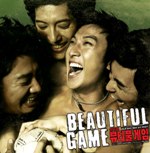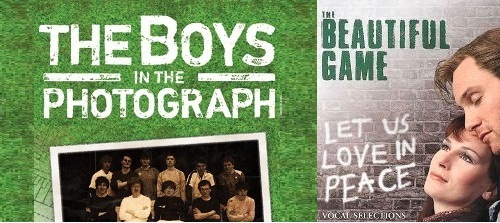
The plot, which is centred on a local football (soccer) team, focuses on the attempt to overcome religious intolerance and violence that has engulfed their community. The team is made up of Catholic and Protestant youths and the coach is a priest. The musical chronicles the ups and downs of the team players as the emerging political and religious violence overwhelms them. Some of the players become members of the IRA, one gets kneecapped.
The musical also chronicles the emotional change in the protagonist from political ambivalence to becoming an IRA terrorist. Highlights of the play include the dual singing of "God's Own Country" by two females, one Catholic, one Protestant; the rain-drenched funeral; the football match; the transformation of the football net into a prison.
Une équipe de foot locale d'Irlande du Nord mélange joueurs catholiques et protestants ce qui, malgré les résultats positifs de l'équipe, déclenche de nombreuses violences. Plusieurs footballeurs rejoignent l'IRA et finiront en prison où ils pourront continuer de pratiquer leur passion. La comédie musicale parle aussi du basculement de quelqu'un qui a des idées vers le pur terrorrisme. Les grands moments du spectacles sont: un duo de femmes "God's Own Country", une Catholique, une Protestante; l'enterrement sous la pluie; le match de football; la transformation du filet du football en prison. La chanson la plus prospère du score était "Notre Genre d'Amour."
Original production synopsis)
Acte I
Football is a part of everyday life in 1960s and 1970s Ireland, as the overture and opening number (The Beautiful Game) demonstrate. It's especially important for Father O'Donnell's team, who are having their first practice on the first day of the season. The star player, John, seems to be a little more interested in one of the girls on the sidelines than he is in the priest, and as a punishment is forced to stay behind and take care of the equipment (Clean the Kit). Meanwhile, Thomas, a fervent Irish Catholic nationalist leads a group of thugs to get another boy, Del, who's an atheist, to quit the team. There's no room for someone like him on a Catholic team.
Mary, the girl John had been noticing during the practice, comes to the locker room to talk to him. Although they initially fight their attraction (Don't Like You), they soon decide to give it a try.
Time passes. John and Mary are quite serious with each other now. She asks him one evening to join her in a march for Catholic rights, but he is more interested in going drinking with his friends. Left alone, Mary is unable to understand why anyone would not love Ireland and want to make it better. Her sentiments are echoed - almost - by a girl with the rival Protestant team. (God's Own Country). John changes his mind and returns to go to the march with Mary, because she is more important to him (God's Own Country Protestant March).
The team makes it to the final, but their celebration is cut short when a group of Protestants trash the locker room. Christine and Del emerge to find the wreckage - they had been making love in hiding during the raid. Surveying the mess, they both wish all the fighting would stop so they could get on with their lives. (Let Us Love in Peace)
It comes down to the final. After the other team tied the goal on a penalty shot, John scores the winning goal (The Final). The boys celebrate at a local pub (Off to the Party, The Craic). Del comes to see Christine, but Thomas and his friends quickly remind him that he isn't welcome. Rather than causing any more unpleasantness, he leaves. Meanwhile, Ginger has finally got up the nerve to speak to Bernadette, who returns his affection (Don't Like You Reprise). They have a first, small kiss, and then she has to go, and Ginger helps Daniel home. After seeing him to his door, Ginger is about to head home himself when he's confronted by a gang of Protestant thugs. His attempt to escape is useless
Christine and Mary are discussing the previous evening at Mary's house. Mary disapproves of the relationship with Del until Christine convinces her that love knows no boundaries (Our Kind of Love). They are interrupted by John who brings the horrible news - Ginger is dead. Thomas arrives and asks John to go with them to get revenge, but he refuses - more violence won't do any good. As they comfort each other and go to the funeral, they all long for an end to the division and for a chance to live a normal life (Let Us Love in Peace Reprise).
Acte II
John and Mary are getting married, and there are some nerves on all sides (The Happiest Day). When the time comes to make their vows though, there are no doubts (To Have and to Hold). Finally they are left alone in their hotel room for their first night together. Both are nervous, but together they work it out (The First Time).
In the middle of the night, the phone rings. It's Thomas, and he's in trouble. He asks for John's help. Mary doesn't want him to go, but John feels he owes it to his friend even though he doesn't agree with what he's doing. He finally finds Thomas and tells him it's the only time he'll ever do something like this. Thomas tries to explain to him why he has to do what he does (I'd Rather Die on My Feet Than Live on My Knees).
John is finally going to get his big break at the soccer trials. On her way to watch, Mary says goodbye to Christine and Del, who are moving to New York to escape the situation there. Mary figures she and John will go to England, and they talk about leaving their home (God's Own Country Reprise).
John makes a great impression and the coaches want him, but someone else wants him too - the police. Someone has tipped them off about how he helped Thomas, and he is taken to prison, before Mary even has a chance to tell him that she's pregnant (The Selection).
John is put with the other IRA prisoners. He tries to stay apart from them, but they work away at him and eventually he begins to think like them. Even Mary has trouble getting through to him. (Dead Zone)
She has her baby, a boy named Sean, and Daniel comes over to see them. While he's there, Thomas and two other IRA agents barge in and accuse Daniel of betraying John. They shoot him in the knee, crippling him. Mary is horrified and wonders if any good could possibly come out of all this violence (If This is What We're Fighting For).
John is finally released, and his first stop is to see Thomas, because he has realized that it was Thomas who turned him over to the police. After confronting him, John kills him.
Mary enters. She tries to find the man within John that she fell in love with, but he is buried too deep. John is going to England to work for the IRA. He leaves his soccer jersey and a picture of the championship team for his son (All the Love I Have).
As Father O'Donnell comes to collect Sean for the football practice, Mary hopes that the cycle of hate can be stopped with her son (Finale).
The boys in the photograph synopsis
Acte I
“The boys in the photograph” begins with Mary, Christine and Bernadette singing the titular number (The boys in the photograph) in front of a monochrome photograph of the Belfast soccer team that is the focus of the play. After this the majority of the casts join in a number about the importance of soccer or foot ball in the lives of the young people of Belfast, Ireland which is currently on the brink of a cultural war. After this Father O’Donnell begins the roll call for the foot ball team including: John Kelly the teams’ star player who is more interested in showing off in front of girls than practicing seriously, Thomas Malloy John’s best friend who is more goal driven, a fervent Irish Catholic and wears glasses (which need to be taped to his head while playing and are referred to multiple times during the play), Del Copeland the only Protestant on the team (though he claims that he is, in fact, an atheist), Daniel Gillen who has a reputation of stealing radios from cars (though he argues that with so many riots taking place it only makes sense to steal the radios before the cars are burnt) and Ginger O’Shaughnessy who wishes for the conflicts between the Irish and Protestants to cease and to be called by his real name, Gregory. We also meet the three Heroines of the play: Mary a bright out-spoken young woman who believes that the conflicts in Ireland can be resolved through peaceful protests, Bernadette a very religious and prudent girl who has been in love with Ginger since they were children and Christine who defies her Catholic up-bringing not only by going with several boys but also by the man she marries later on.
After the practice Father O’Donnell gives each member of the team a copy of the team photograph along with the lecture to “…Never forget the promise of your youth. This picture is who you are, who you become is up to you” he also puts John on equipment cleaning duty, much to John’s annoyance (Cleaning Kit). While John is imagining his future as the star player for a national team Mary walks in and tells him that he’ll never make a national team since he spends too much time chasing girls. Father O’Donnell then enters the locker room and tells John that the reason he’s harder on him is because he believes that John could be great if he focuses on his game and that there will be plenty of time for girls once he’s famous and can have any kind of girl he wants (to the disgust of Mary, who is hiding near -by due to the rule that girls aren’t allowed in the locker room). John and Mary further argue with each other (Don’t Like You) and eventually grow close and fall in love. Meanwhile Thomas, along with a couple of nameless team mates, threaten Del with violence if he comes to practice again. Thomas having no tolerance for Protestants after one beat up his sister the other day (this also provides a hint of things to come). Eventually Mary and John are in a steady relationship with one another and although at first he does not want to join her in petitioning for Irish rights, being more interested in having fun with his team mates leaving Mary disappointed not only with John but with her neighbours defeatist attitude (God’s Own Country/God’s Own Country- Protestant March). However John eventually comes around and decides that he at least should be there for Mary. Meanwhile Christine and Del have had their own romantic encounter having both taken shelter in an abandoned car during a raid and discovering that despite their different backgrounds that they have a lot in common (Born In Belfast).
Eventually the final game of the season comes and the team has a chance to win the championship (The Final) and despite Thomas being caught by the referee for tripping a member of the other team giving them a penalty kick, John manages to score the winning goal. After their victory the team and their supporters go celebrate at the local pub (Off To The Party/ The Craic). Del and Christine also go to the party though Thomas makes it clear that they aren’t welcome while John wonders where he’s been all season and despite Christine’s insistence that Del has as much of a right to be there as any other member of the team, Del insists that they should leave to avoid causing any trouble. At the same time Ginger and Bernadette begin to realize their feelings for each other, their shared wishes for peace and kiss for the first time (Let Us Love In Peace). However after the party Ginger helps Daniel home and on the way back to his own home, is attacked by a gang of young Protestants and is unable to get away. Meanwhile, the girls are gathered at one of their homes and discussing the evening and their relationships when they receive news that Ginger has been killed and was found miles away from where he went missing. At the funeral Thomas wants to go get revenge for Ginger’s death but is talked out of it when he is reminded that he does not know which Protestant boys are to blame and that if he were to attack some random boys that he would be no better than they are.
Acte II
The second act begins with John and Mary’s wedding day and both are nervous about committing to marry (The Happiest Day Of Our Lives) but manage to get through the ceremony. Later the two are alone and spending their first night alone together in a hotel and looking back on their relationship so far (All The Love I Have/Don’t Like You-reprise) and are nervous to be having their first intercourse ,but eventually do manage to overcome the feelings of awkwardness (The First Time). Later that night they receive a phone call from Thomas who is wanted due to his work for the IRA and while trying to reach a safe house has lost his glasses. Even though Mary protests that he could be arrested too for helping Thomas or even killed, John insists that he can’t leave his friend and that this will be the only time he does this. John eventually finds Tom and drives him to the safe house while the two make it clear to the other that they don’t understand their stance on the issue (I’d Rather Die On My Feet Than Live On My Knees).
Some time later John is finally getting the chance to try out for a national team and is making a great impression on the team scouts. Meanwhile Mary is saying good bye to Christine, Del and their baby son Hendrix who are moving overseas (God’s Own Country-Reprise) and reveals to Christine that she is going to have a child of her own soon, but is waiting until after John’s tryouts to tell him. Unfortunately she doesn’t get the chance to tell him until much later as he’s arrested after the tryouts for helping Thomas escape John is then sent to prison, after the other IRA prisoners act as if he were one of them he explains that he is not an IRA agent and was only arrested because he tried to help a friend while the other agents tell him the only friends he has now are his prison mates. However as John adjusts to prison life while waiting to be released he becomes more and more frustrated with the world that has failed him and nobody can get through to him (The Dead Zone). Eventually Mary has her child, her son Sean, but one night Thomas (who Mary recognises immediately because of his glasses) enters her home with a few other IRA workers and tells her that Daniel, who is sitting in the living room, is the one that reported John to the authorities. Daniel argues that he would never do such a thing but despite his support by Mary and Bernadette is still taken outside and kneecapped (If This Is What We’re Fighting For). Eventually John is released from prison, but has been changed by his experience and wants to go to England to help the IRA, while Mary is disappointed that the man she loves no longer seems to exist. After John gives her his football jersey for their son Mary gives John a copy of the team photograph telling him that before he goes to England to remember that his true self was his first victim. Although he still goes to “take care of some business” John does remember what Father O’Donnell said when he gave them the photo but still tracks down Thomas having noticed while in jail how suspicious it was that Tom was never arrested. Thomas then reveals that he has managed to stay out of jail by reporting others and that he no longer cares if he dies or not since the cycle of violence is endless and he has more than replaced himself with angry men (It Will Never End). John is poised to shoot Thomas but in the end he takes Mary’s comment to heart and puts his gun away telling Tom “I could shoot the man you’ve become, but I can’t shoot the man you were” and leaves while Tom bids his last farewell to John, knowing that he has angered so many people he probably won’t live to see the next day. As John leaves a gunshot is heard off stage. Meanwhile Mary is sitting at home, looking at her copy of the team photograph and looking back on the fates of most of the boys, when John arrives having remembered who he really is (All The Love I Have). Then the finale begins (Finale- The Beautiful Game) and the screen that had been used through-out the play to show historical new footage reveals the bright futures that awaited everyone including that John, despite not making the national team he did become the coach of the school’s team, Sean grew-up hating Football and went into fine arts while his younger sister did make a national team and that the division did eventually end after 30 years
"The Beautiful Game" restera dans les mémoires comme le plus grand échec d'Andrew Lloyd Webber, et en plus immérité selon nous, car contrairement à "Jeeves", il est peu probable que "Beautiful Game" connaisse une nouvelle incarnation. Pourtant Andrew Lloyd Webber avait tapé fort en engageant l'auteur Ben Elton (The Young Ones-Blackadder). Malheureusement cette histoire mélangeant football et guerre de religion en Irlande du Nord ne trouvera jamais son public et ne tiendra l'affiche que 11 mois à Londres au Cambridge Theater, et ne sera jamais adaptée à Broadway.
1 Beautiful Game (The) s'intéresse à un événement historique important: Troubles en Irlande du Nord.
The title of the musical is taken from Pelé's autobiography My Life and the Beautiful Game. The plot, which is centred on a local football (soccer) team, focuses on the attempt to overcome religious intolerance and violence that has engulfed their community. The team is made up of Catholic and Protestant youths and the coach is a priest.
Beautiful Game
The world premiere production of The Beautiful Game opened on September 26, 2000 at the Cambridge Theatre in London and closed September 1, 2001, after a total run of slightly more than 11 months. Directed by Robert Carsen, the choreography was by Meryl Tankard. The show was met with a mixed reception from the critics: while the production and Lloyd Webber's score were largely praised, Elton's book and lyrics came under fire for being crass, predictable and undistinguished.
The show never made a transfer to Broadway.
The Boys in the Photograph
A rewrite by Lloyd-Webber and Elton, with a new title of The Boys in the Photograph, had a full scale production mounted in April 2009 at the Manitoba Theatre Centre in Winnipeg, Manitoba, Canada. This production transferred to the Royal Alexandra Theatre in Toronto, Canada in September 2009 with a rumored North American Tour to follow retaining the entire Canadian cast. The rewrite gives a more uplifting ending than the original production.
Prior to this, The Boys in the Photograph received a workshop production by students at the Liverpool Institute for Performing Arts in April 2008. It opened with the following cast Matthew Grace as John, Jeanna De Waal as Mary, Adam Diggle as Del, Derek Barr as Thomas, Cecilia Ardiles as Christine, Richard Loosemore as Ginger, Rob Gilbert as Daniel and Bryn Holding as Father O'Donnel. It was directed by Nick Phillips.
The Beautiful Game - Titre à la création
The Boys on the Photograph - Titre de la nouvelle adaptation signée Andrew Lloyd Webber - et nouvelle version officielle - présentée au Manitoba Theatre Centre à Winnipeg au Canada
Acte I
Overture 3
The Beautiful Game
The Boys in the Photograph*
Clean the Kit
Don't Like You
God's Own Country
God's Own Country - (Protestant March)
Born in Belfast*
The Final
The Party
Let Us Love In Peace
Let Us Love In Peace (reprise)
Acte II
The Happiest Day of Our Lives
All The Love I Have*
Don't Like You (Reprise)
The First Time
I'd Rather Die On My Feet Than Live On My Knees
God's Own Country/Born in Belfast (reprise)
The Selection
Dead Zone
If This Is What We're Fighting For
It Will Never End*
All The Love I Have* (Reprise)
Finale - The Beautiful Game
(*= Songs added for The Boys in the Photograph)
(**= Songs removed from The Beautiful Game for The Boys in the Photograph)
Aucun dossier informatif complémentaire concernant Beautiful Game (The)
Aucun dossier informatif complémentaire concernant Beautiful Game (The)
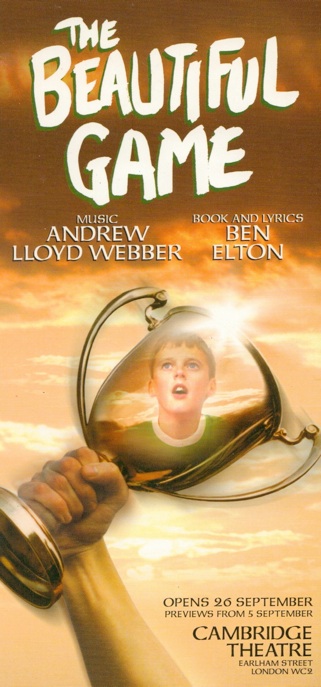
Version 1
Beautiful Game (The) (2000-09-Cambridge Theatre-London)
Type de série: OriginalThéâtre: Cambridge Theatre (Londres - Angleterre) Durée : 11 mois 1 semaine Nombre : 391 représentationsPremière Preview : 05 September 2000
Première: 26 September 2000
Dernière: 01 September 2001Mise en scène : Robert Carsen • Chorégraphie : Meryl Tankard • Producteur : Star(s) : Avec: Frank Grimes (Father O ’Donnell), Ben Goddard (Del), Hannah Waddingham (Christine), Michael Shaeffer (Thomas), David Shannon (John), Josie Walker (Mary), Dale Meeks (Greg), Jamie Golding, Alex Sharpe, Diane Pilkington, Nic Greenshields, David LyonsCommentaires : This show truly divided the critics. Some claimed it was a powerful, dark, intelligent musical, containing some of Lloyd Webber’s most sophisticated and deeply-felt music; others claimed it was a one-sided, patronising Romeo and Juliet rip-off, mis-matching over-romanticised music with an over-done tale of murder, knee-capping and internment camps. The show ran for just under a year, closing on September 1st, 2001. A re-written version was performed in Canada in 2009 with a new title “The Boys in the Photograph” and a happier ending. The song "Our Kind of Love" was replaced with a new song "The Boys in the Photograph" and several other songs were cut. (However, “Our Kind of Love” would be re-worked and appear in Andrew Lloyd Webber’s later musical “Love Never Dies”.)Presse : The show has received 'reasonable ' reviews from the popular press. None of the press have been shouting from the roof-tops on how good it is, but then none have rubbished it either…..
BENEDICT NIGHTINGALE for THE TIMES says, "Elton doesn't always seem aware of the line between the simple and the clunky. But Webber not only extends his musical range but comes up with two or three lovely numbers, each packed with his trademark yearning." He goes on to say, "There are no truly exciting performances, but also no weak ones."
NICHOLAS DE JONGH for THE EVENING STANDARD says, "A dramatic, pioneering musical that dares to make a song and dance of the troubles of Northern Ireland." He goes on to say, "Robert Carsen's well-drilled and paced production cannot disguise the fact that Elton's book allows dull romancing to overwhelm a brave, sharp shot at a controversial, politically motivated musical."
SHERIDAN MORLEY for TELETEXT, says, "Lloyd Webber's songs are intricately slotted into the storyline and many of them have a lilting, yearning charm." Morley ends his review with, "What this show suggests is that you no longer have to go to a musical having checked your brains into the cloakroom."
PAUL TAYLER for THE INDEPENDENT says, "The Beautiful Game has its moments, with full-throated, plangent anthems; the impossibly catchy melody of its message-song, "Our Kind of Love"; and the hard-edged, exuberant synthesis, in the kicking twirls and leaps of Meryl Tankard's choreography, of the movements of football and modern ballet." He goes on to say, "The trouble with the show is not the Celtic-tinged music, which is never less than decent, nor the lyrics which, though uninspired, aren't actively blush-making. No, the culprit here is the book."
CHARLES SPENCER for THE DAILY TELEGRAPH says, "Sadly, hopes that The Beautiful Game might prove a Northern Irish West Side Story are hardly realised. Indeed, at worst the piece comes over like Grease-meets-Riverdance with the odd bit of earnest Eltonesque moralising thrown in." However, Spencer goes on to say, "The music includes some of Lloyd Webber's most haunting and memorable ballads."
MICHAEL BILLINGTON for THE GUARDIAN says, "Even if the musical falls at the last hurdle, it as at least trying something boldly different, and Lloyd Webber's score, with its echoes of Irish folk and ballad music, is his best since Aspects of Love."
JOHN PETER for THE SUNDAY TIMES says Andrew Lloyd Webber "romps home with his best work since Cats and his finest piece of musical theatre ever".
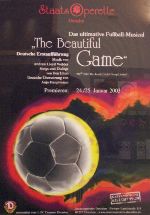
Version 2
Beautiful Game (The) (2003-01-Staatsoperette-Dresden)
Type de série: RevivalThéâtre: Staatsoperette Dresden (Dresden - Allemagne) Durée : Nombre : Première Preview : Inconnu
Première: 24 January 2003
Dernière: InconnuMise en scène : Chorégraphie : Producteur : Star(s) : Presse : Avec: Mary: Christina Elbe/Martina Haeger - John: Marcus Günzel/Gerald Michel - Thomas: Christian Theodoridis/Jens Winkelmann - Del: Michael Seeboth/Gerd Wiemer - Christine: Romy Hildebrandt/Judith C. Jakob - Bernadette: Mandy Garbrecht - Daniel: Tomasz Dziecieski/René Schwarzer - Ginger: Christoph Dyck - Pater O' Donnell: Wolfgang Amberger/Hilmar Meier - Protestantisches Mädchen: Simone Lichtenstein - Sean Kelly: Florian Bräuer/Boris Koppitz/Alexander Taraduko
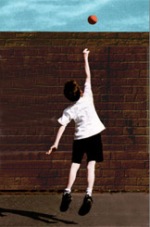
Version 6
Beautiful Game (The) (2007-12-Madach Theatre-Budapest)
Type de série: RevivalThéâtre: Madach Theatre (Budapest - Hongrie) Durée : Nombre : Première Preview : Inconnu
Première: 01 December 2007
Dernière: 02 March 2008Mise en scène : Chorégraphie : Producteur : Star(s) : Commentaires longs: Première série : les 1er/12/2007 (19:00), 2/12/2007 (15:00 et 19:00), 3/12/2007 (19:00), 4/12/2007 (19:00)
Seconde série : 28/2/2008 (19:00), 29/2/2008 (19:00), 1/3/2008 (15:00 et 19:00), 2/3/2008 (15:00 et 19:00)
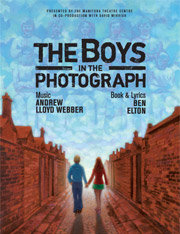
Version 7
Beautiful Game (The) (2009-09-Manitoba Theatre Centre-Winnipeg)
Type de série:Théâtre: Manitoba Theatre Centre (Winnipeg - Canada) Durée : 3 semaines Nombre : Première Preview : 30 April 2009
Première: 30 April 2009
Dernière: 23 May 2009Mise en scène : Chorégraphie : Producteur : Star(s) : Commentaires longs: Spectacle joué sous le titre 'The boys in the photograph" dont cela a été la création mondiale.

Version 8
Beautiful Game (The) (2009-09-Royal Alexandra Theatre-Toronto)
Type de série: OriginalThéâtre: Royal Alexandra Theatre (Toronto - Canada) Durée : 1 mois 1 semaine Nombre : Première Preview : Inconnu
Première: 22 September 2009
Dernière: 01 November 2009Mise en scène : ???? ???? • Chorégraphie : ???? ???? • Producteur : Star(s) : Commentaires longs: Spectacle joué sous le titre 'The boys in the photograph"
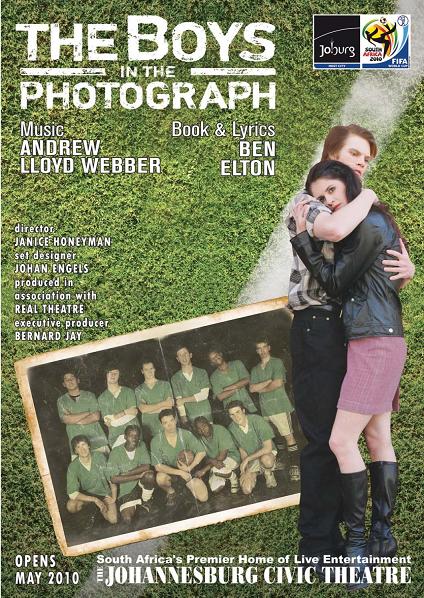
Version 9
Beautiful Game (The) (2011-05-Mendela Theatre@Joburg Theatre Complex-Johannesburg)
Type de série: RevivalThéâtre: Mendela Theatre@Joburg Theatre Complex (Johannesburg - Afrique du Sud) Durée : 1 mois 3 semaines Nombre : Première Preview : 18 May 2011
Première: 18 May 2011
Dernière: 11 July 2010Mise en scène : Janice Honeyman • Chorégraphie : Aucun • Producteur : Star(s) :

Version 10
Beautiful Game (The) (2014-04-Union Theatre-London)
Type de série: RevivalThéâtre: Union Theatre (Londres - Angleterre) Durée : 3 semaines Nombre : Première Preview : 03 April 2014
Première: 08 April 2014
Dernière: 03 May 2014Mise en scène : Lotte Wakeham • Chorégraphie : Producteur : Star(s) : Avec: Niamh Perry (Mary), Ben Kerr (John), Stephen Barry (Del), Daniella Bowen (Christine) , Freddie Rogers (Thomas), Will Jeffs (Daniel), Alan McHale (Ginger), Natalie Douglas (Bernadette), and Carl McCrystal (Father O Donnell). Ensemble: Tom Brandon-Farrell, Leigh Lothian, Shane McDaid, Joanna O Hare and Charlie Royce.
Pas encore de video disponible pour ce spectacle
